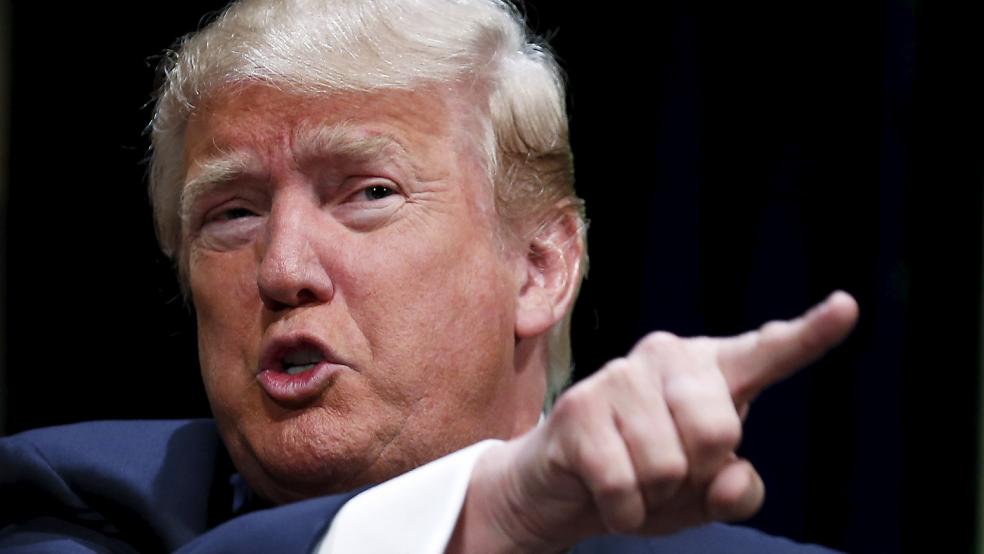Donald Trump gave an amazing speech about his approach to US foreign policy on Wednesday, at least according to Donald Trump. At an event sponsored by the Center for the National Interest, the Republican presidential frontrunner delivered a 5,000-word speech touching on his criticisms of the Obama administration’s approach to national security, the need to whip US allies into shape, and promised that he alone can restore what he described as the lost standing of the US in world affairs.
A Trump foreign policy would eschew “nation building” but would still somehow promote stability worldwide. It would teach our allies to trust us again, even while making a point of behaving “unpredictably.” It would teach the US military to “fight to win,” as opposed to...whatever it is he thinks the military does now.
Related: Trump Scoffs at Cruz’s ‘30 percent Solution’ in Indiana
It was, again according to Trump, a huge success.
Thank you to all for the wonderful reviews of my foreign policy speech. I will soon be speaking in great detail on numerous other topics!
— Donald J. Trump (@realDonaldTrump) April 28, 2016
But outside the echo chamber of Trump’s inner circle and the mogul’s own Twitter feed, it’s hard to find many people who know something about foreign policy that were impressed.
The centrist group Third Way wrote, “Donald Trump lacks a meaningful understanding of US foreign policy.” His speech Wednesday “showed just how incoherent and inconsistent his views are on national security issues” and revealed that Trump is “out of his depth.”
Dan Drezner, professor of international politics at the Fletcher School of Law and Diplomacy at Tufts University and a regular Washington Post columnist, said that despite his previous criticism of Trump on national security grounds, he tuned in to the speech.
Related: To Beat Hillary, Trump Has to Agree to a ‘Presidential Makeover’
“I decided to listen to it. Sober. That was my first mistake,” Drezner wrote. After cataloguing a raft of Trump’s contradictions and misapprehensions in the billionaire’s remarks, he wrote, “Trump doesn’t really have any useful ideas or strategies to offer for how to improve American foreign policy.”
The Wall Street Journal editorial page was equally unimpressed. “The central motif, like all of Mr. Trump’s political thought, is that the businessman has the brains and strength to solve a given problem and everybody else is a pathetic loser, so trust his instincts and temperament.”
The Journal also pointed out the speech’s many internal inconsistencies, noting, “For prepared remarks, or for that matter even an after-dinner talk, Mr. Trump’s speech was especially rife with contradictions.”
The general incoherence of the speech was pointed out by many experienced foreign policy analysts and reporters across the ideological spectrum, including Julia Ioffe at Foreign Policy, Peter Beinart at The Atlantic, and Max Boot of the Center on Foreign Relations.
Related: Trump Plays the ‘Woman Card’ Against Hillary. Will It Backfire?
To be fair to Trump, some folks liked his speech. For example, right-wing pundit Ann Coulter called it, “The greatest foreign policy speech since Washington’s farewell address.” Really, she did. In all caps, too.
Writing for the Washington Examiner, Kelly Riddell was quite indignant about all the pundits and experts pointing out that Trump’s speech was, from a policy perspective, a mess. Without specifically defending it against the critics, she pushed back with a very Trumpian argument -- people who aren’t experts in the field like what he’s saying.
“Who’d have thought all of these foreign-policy experts and pundits would be absolutely wigged out at the prospect of making America first?” she wrote. “Perhaps they need to get off Twitter and get more in touch with the American public. Because obviously, Mr. Trump’s message – and not theirs – is the one that’s registering. Oh how frustrating that must be.”
Sen. Bob Corker, who chairs the Senate Foreign Relations Committee, surprised many people by declaring the speech a “great step in the right direction” that was “full of substance.”
In a written statement, though, he seemed to concede that maybe there wasn’t that much substance. “I look forward to hearing more details, but in a year where angry rhetoric has defined the presidential race on both sides of the aisle, it is my hope that candidates in both parties will begin focusing not only on the problems we face but on solutions,” he wrote.





